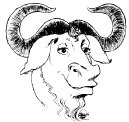

In view of the increasing commercialization of the Free Software movement, it has become important to clarify a matter of business ethics that is all too often overlooked.
This has to do with monopolies. Copyright law allows the authors of computer programs to have, for a limited period of time, monopoly rights to modifying and copying the program. For the sake of illustration, let's compare this monopoly to a monopoly of oranges: Imagine that in the whole world there was only one place where orange trees grow, and imagine furthermore that I am the owner of that area. Then I have a monopoly of oranges. Let's suppose that I am generous and put up a sign that says "Everyone is welcome to come and pick oranges". It won't take long before some entrepreneurial people pick more oranges than they want to eat themselves, and start a business of selling oranges. As long as there are still plenty of oranges for everyone who wants to pick oranges, I wouldn't mind that. Effectively, what the businesses are selling is the convenience of being able to conveniently buy the oranges, without bothering about the harvest and transportation of the oranges.
This situation is comparable to a market for software which can be freely copied and redistributed, without any monopolies.
However, I would get very upset if someone came and harvested all oranges in order to gain control of the market and sell the oranges at a higher price. That would be exploiting my generosity in a totally unethical manner.
In the same way, when I contribute to a Free Software project, then I want my contribution to be for everyone's benefit, and I do not want anyone to turn it into a monopoly. In fact the whole point of the Free Software movement is to get rid of software monopolies. (Proprietary software is software which has an "owner" who has a monopoly through having the right to decide who can see the source code, who may modify the program, and who may copy it for purposes of further distribution. Free Software is software where every user has these rights.)
The Free Software community welcomes businesses to get involved. We don't mind when the involved companies derive a profit from their involvement (why else would be profit-oriented company get involved) as long as these companies fight together with us at least against the worst software monopolies.
In particular, we think that every business which chooses to use the fruits of our generosity, and to derive an economic benefit from these Free Software programs, should
In the context of DotGNU project this means:
You are invited to add your comments concerning this at the appropriate page of the DotGNU Wiki
Verbatim copying and distribution of this entire article are permitted in any medium or format, provided this notice is preserved.
This page is maintained by Norbert Bollow <nb@SoftwareEconomics.biz> with support from the DotGNU Developers mailing list.